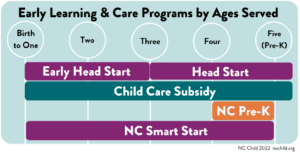For working families, few things are more stressful than child care. Finding safe, affordable, quality care for a young child usually means long wait lists and big financial sacrifices, especially in rural parts of the state where there are fewer options. Recent data from the US Census show that 176,984 North Carolina families were not working this summer because they didn’t have the child care they needed. With costs as high as college tuition, it’s no wonder low- and middle-income families are struggling to afford the care they need.
Funding shortfalls lock families out – especially those with the youngest children
Every year, tens of thousands of young children from low-income families benefit from North Carolina’s early learning and care programs. Unfortunately, due to funding rates and levels set by the NC General Assembly, these programs serve fewer than half of eligible children. The younger the child, the less likely they are to be served. Inadequate funding puts child care and early learning out of reach for thousands of families who want to work and support their children.
Download our new fact sheet
The Child Care Subsidy program is designed to put care within reach
One of the most important programs designed to put child care within reach is the Child Care Subsidy Assistance Program. Subsidy serves children ages birth to 5, and children in school (ages 5-12) may receive care outside school hours. To be eligible, low-income families must be either working or enrolled in school. In North Carolina, the initial eligibility criteria for children birth to five is 200% of the federal poverty level (FPL). For school-aged children the limit is 133% FPL. Families may be required to pay up to a 10% co-pay based on family income.
Subsidy is a key program for working families, but it only reaches a fraction of eligible children. The state of North Carolina uses federal Child Care Development Block Grant (CCDBG) funds to pay for the program, and the NC General Assembly allocates a state match. At current funding levels, only 17% of eligible children across the state are being served, with thousands on county waiting lists. What’s more, the rate at which child care providers are reimbursed for subsidy is often much too low, especially in rural counties. Read more on subsidy rates here.
A suite of related programs provide quality and choice for families – just not enough
North Carolina is a national leader in high-quality early childhood programs. Besides the subsidy program, there are several other related programs that help families enroll in and afford high-quality care. Each serves different age levels, and has different eligibility requirements:
Head Start & Early Head Start – A federally-funded program providing comprehensive early learning, health, and nutrition support services to children birth to age five who are living in poverty, experiencing homelessness, or in foster care. Early Head Start serves children under age 3; Head Start serves children ages 3 to 5.
Smart Start – A state-funded program that serves children birth to five, according to a needs formula. The Smart Start network is comprised of 75 local partnerships and the North Carolina Partnership for Children, together serving all 100 North Carolina counties. Smart Start uses evidence-based programs that improve access to high-quality early learning experiences, promote young children’s health, and provide family support services such as home visiting and early literacy.
NC Pre-K – A mostly state-funded preschool program serving 4-year-old children from families with income at or below 75% State Median Income (SMI), or other documented categories. Pre-K is a high-quality program typically available on the school-year calendar, and during school hours.
Each of these programs provides excellent, high-quality early education experiences to eligible babies and young children. Unfortunately only a fraction of eligible children ever get the chance to enroll, due to inadequate funding levels. None of these programs is “better” or more important than another. Investments in all of these programs create a strong early childhood education & care system that can meet the needs of every family in every corner of North Carolina.
Take Action
Both federal and state elected leaders must allocate more state funding to these keystone programs, so that every child gets the chance at early learning. Working parents deserve the chance to enroll their children in safe, high-quality care so that they can support their families. Contact your federal legislators now.



